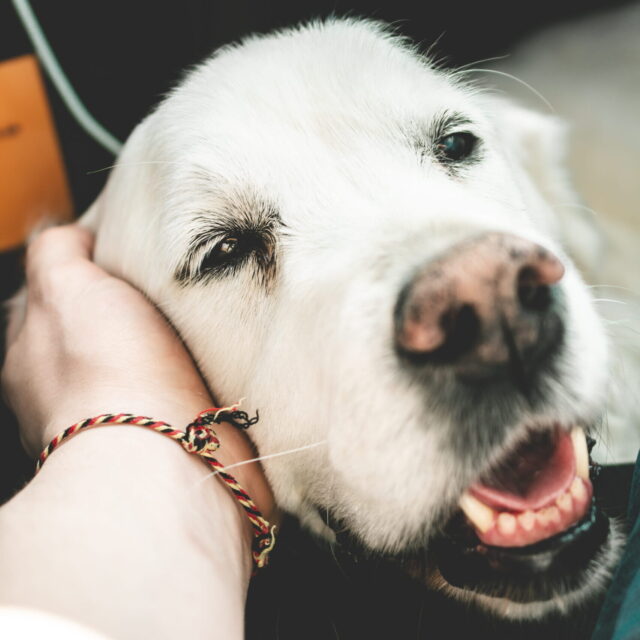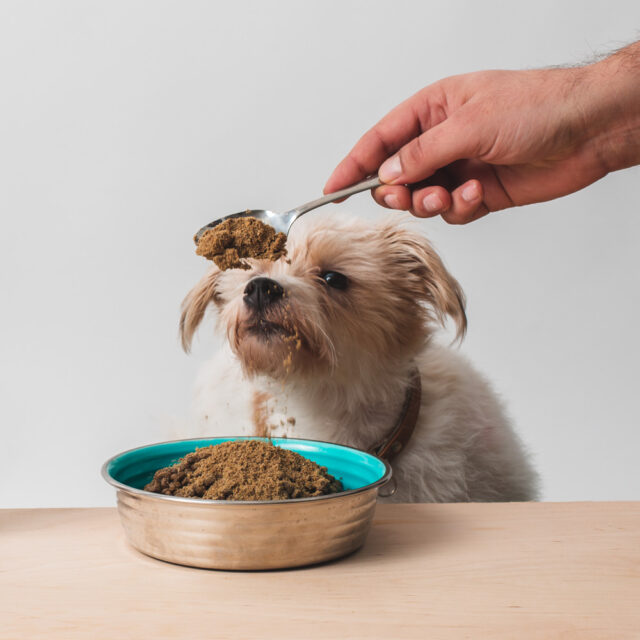
There are a few things all dog parents have in common: We all want our dogs to be healthy; we all want them to be happy; and we all want them to live the longest lives possible.
Like humans, some dogs are genetically programmed to live longer. A recent study published in Frontiers In Genetics examined overlapping genes from two dogs in their twenties. While more research is needed to confirm their findings, the authors hypothesize that fine-tuning gene expression may be the key to extreme longevity in both dogs and humans.

Someday we may be able to prolong our dogs’ lives through selective breeding, but for the time being, we will have to rely on tried-and-true science. Veterinarians, dog trainers, and holistic experts recommend these 15 simple strategies to help your dog live longer.
1. Control their calorie intake.
It should come as no surprise that dogs of a healthy weight outlive their obese counterparts. In fact, even a small reduction in calories can make a big difference. According to a 2011 study, dogs that eat about 25% less than the “normal” recommended amount of food live an average of two years longer.
This makes sense when you consider that most pet food manufacturers over-estimate how much your dog should eat in order to sell more food. Instead of using the feeding chart on the package to determine how much to feed, ask your veterinarian to calculate the right number of calories for your dog’s individual needs.
“Keeping dogs trim is the one thing we have great evidence for that leads to an increased life span,” veterinarian Deborah E. Linder, head of the Tufts Obesity Clinic for Animals, confirms.

2. Choose a diet with high-quality ingredients.
Healthy feeding is about much more than just calorie control. The quality of the food matters just as much, if not more.
“Pets fed a high quality diet have a shiny hair coat, healthy skin, and bright eyes,” says Lori Huston, DVM. “A good diet can help strengthen your pet’s immune system, help maintain his or her intestinal health, help increase his or her mental acuity, help keep joints and muscles healthy, and much more.”
As a rule of thumb, veterinarians recommend avoiding foods with artificial ingredients, cheap fillers, food dyes, and excess sugar or sodium. Low-grade meat byproducts and foods with less than 20 percent crude protein are additional red flags.
Many pet parents are choosing a variety of fresh, home-cooked, and flash-frozen options for better health and vitality. Dry kibble simply cannot compare to lean, responsibly-sourced meat, fresh fruits and veggies, and nutrient-dense superfoods like fish oil and chia seeds.
3. Give Probiotics.
Approximately 70% of the cells that make up your dog’s immune system live in the gut. If you want your dog to live longer, keep their belly happy with probiotics.
“Probiotics are an excellent way to balance your dog’s stomach bacteria levels,” writes canine herbalist, Rita Hogan. “Balanced gut bacteria leads to healthy digestion and a strong immune system. Gut health has a direct correlation to overall well-being.”
Probiotics help your dog fight off disease-causing invaders and prevent the sluggish, sickly feeling that comes along with poor digestion. When dogs feel good, they get more enjoyment out of life.

4. Store Food Properly.
Improper food storage can lead to food poisoning, rancid kibble, infiltration by pests, and deadly bacterial infections.
Here are a few basic rules for storing your dog’s kibble and/or canned food:
- Seal food containers tightly between each use to prevent contamination by bacteria.
- Store dry food and unopened canned food in a cool, dry environment to prevent vitamin loss and rancidity.
- Once open, canned pet food should not be left out of the refrigerator for longer than 2 to 4 hours.
- Contact the manufacturer to find out how long your dog’s dry food lasts once the bag is opened.
- If using a storage bin, place the entire bag inside rather than pouring the kibble into the bin. This provides a fat barrier and preserves flavor.
5. Use better bowls.
There are some extremely cute dog bowls out there, but they may not be the most healthy options. Plastic bowls can cause allergies and collect disease-causing bacteria. Ceramic feeding dishes are easily broken or chipped, and the glaze may contain dangerous lead.
The safest options are stainless steel and glass bowls because they are easy to clean and do not contain toxic materials. Just be sure to wash them properly between every use with hot water and dish soap, according to the FDA.

6. Get their hearts pumping every day.
Daily cardiovascular exercise strengthens the heart muscle and can certainly help your dog live longer. It can also help your dog live better by lowering stress, increasing endorphins, and balancing mood.
The amount of physical activity your dog needs depends on size, age, breed, and overall health, but usually ranges from 30 minutes to 2 hours per day. Even if your dog is old or has physical limitations, you can still encourage them to exercise.
“Put a leash on your dog and take them for a few laps around your backyard or house. Or put a leash on them and take them for a tour around the inside of your house,” says veterinarian, Dr. Shari Brown. “Anything to get him moving.”
7. No roaming.
Some people believe dogs should wander freely like their wild ancestors. However, domestic dogs are not wolves, and they face many life-shortening dangers if left to their own devices. They could be hit by a car, shot by an angry property owner, poisoned by antifreeze, preyed upon by larger animals, and much more.
The safe, responsible choice is to keep your dog on a leash or behind a fence when outdoors. Additionally, dogs with registered microchips are nearly 250% more likely to reunite with their owners safely.

8. Train the recall command.
If you want your dog to live longer, training them to come when called is vital. Learn more about why dogs run away and how to teach them to return to your side on command.
9. Support their joints.
Mobility issues are a leading cause of euthanasia, especially in larger dogs. Declining joint health can become so severe that some dogs cannot get up after sleeping, climb stairs, or make it outside to go potty. In addition to these functional problems, deteriorating joints cause extreme pain, lowering your dog’s quality of life.
Protect your dog’s cartilage and bones with low impact exercise and supplements rich in joint supporting ingredients like Glucosamine, Chondroitin, MSM, and Turmeric.

10. Prioritize dental health.
Dental disease can have even more significant consequences than tooth loss and painful gums. Allowing oral health issues to escalate can result in life-threatening heart and kidney disease. In a Q & A about professional dental care in pets, Dr. Patty Khuly writes:
“Periodontal disease has been demonstrated to lead to difficult-to-identify pain, tooth loss (more pain), tooth root abscesses (even more pain), heart valve infections, kidney and liver disease and is correlated with a shorter lifespan in both pets and humans. ‘Nuff said.”
If you want your dog to live longer, begin a dental health routine early, and stick with it throughout their life. Even if brushing is too big of a challenge, products like dental chews, treats, toys, and rinses ensure that all dogs can have healthier mouths.
11. Use filtered water.
Depending on where you live, tap water your dog drinks may be full of contaminants like heavy metals, chlorine, and pharmaceuticals. Even the fluoride purposely added to many water supplies can be harmful to your dog in large amounts.
“Chances are the amounts of contaminants in our water aren’t all that dangerous in small doses,” says water expert Michael Cervin, senior editor at BottledWaterWeb.com and author of the book, Our World of Water: The Good, the Bad, and The Ugly of Earth’s Most Critical Resource, “but the growing amount of them in our water is. There are about 60,000 different chemicals used in the U.S. currently, yet less than 1% of those are screened for public water testing.”
While water filtration systems help eliminate some contaminants, Cervin says the safest option is filtered, pre-bottled water.

12. Limit the chemicals that enter their bodies.
One major secret to a longer life is avoiding as many unnecessary chemicals as possible. Vaccines are extremely important for puppies, and all dogs need boosters from time to time, but yearly vaccinations may be excessive.
Additionally, certain flea and tick preventatives get into your dog’s bloodstream and can cause adverse reactions like allergies, skin issues, seizures, and even death. They also force your dog’s liver to work overtime to metabolize all the excess toxins.
“Longevity is all about toxic load,” writes canine herbalist, Rita Hogan. “Toxic load can be explained by the amount of toxins you put in your body and how your body processes those toxins.”
Consult your vet as to which medications and vaccines are safest for your dog. You may also consider running yearly antibody titers to prevent over-vaccination.
13. Stay on schedule with recommended vet visits.
Many pet parents wonder, “Why should I take my dog to the vet if they are not sick?” The fact is, some dogs do not show outward signs of pain or illness until their disease is quite advanced. Our dogs also age more quickly than we do, so yearly vet visits just do not cut it, especially for older dogs.
“If a disease or condition can be detected before your dog shows signs of illness, steps can often be taken to manage or correct the problem before irreversible damage occurs, therefore improving the prognosis for a successful outcome.”
The sooner your vet pinpoints a problem, the better the chances are for successful treatment.

14. Know the signs of illness.
Do you know what color your dog’s gums should be? How about the subtle signs of diabetes, thyroid disease, or a neurological disorder? The more you know about the common signs of illness in dogs, the better equipped you will be to seek help when it counts.
15. Play!
Play is essential for your dog’s health. Not only is it an excellent source of cardiovascular exercise, but it also relieves boredom, stimulates the mind, and provides a wonderful bonding opportunity.
How do these benefits help your dog live longer? By staving off boredom, play helps prevent your dog from getting into dangerous mischief like household toxins and escape attempts.
As for mental stimulation, research shows that puzzle games help keep senior minds active and prevent cognitive decline – especially when there are treats for rewards.
“These kinds of mental games help wake up areas of the brain that have been inactive,” says Leticia Fanucchi, DVM, a veterinarian and clinical instructor at Washington State University. “The combination of sight, scent, and spatial orientation required to solve the puzzle helped make connections between different parts of the brain. The tasty reward motivated the dogs to stick with the activity.”
Best of all, play gives you the chance to get silly with your pup. When you put aside your responsibilities and romp with your dog, it relieves stress, lowers blood pressure, and increases endorphins for both of you. There is no better or healthier way to strengthen your bond.

The heartbreaking fact is that you will likely outlive your pup. However, with lots of love and conscientious care, you may be able to help your dog live longer and enjoy better health in the time you have together.
The post 15 Ways To Help Your Dog Live Longer appeared first on iHeartDogs.com.
via Whisker Therapy